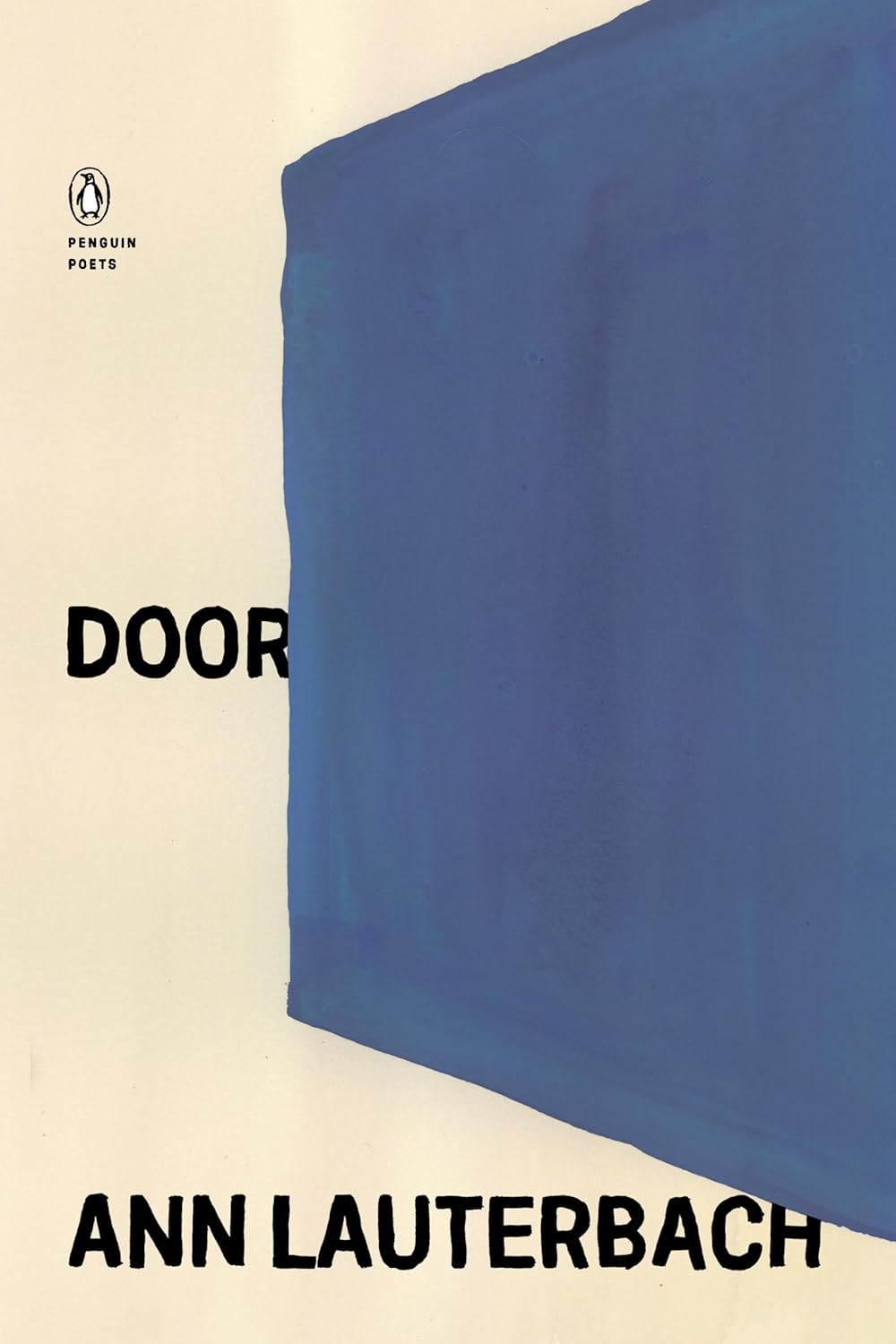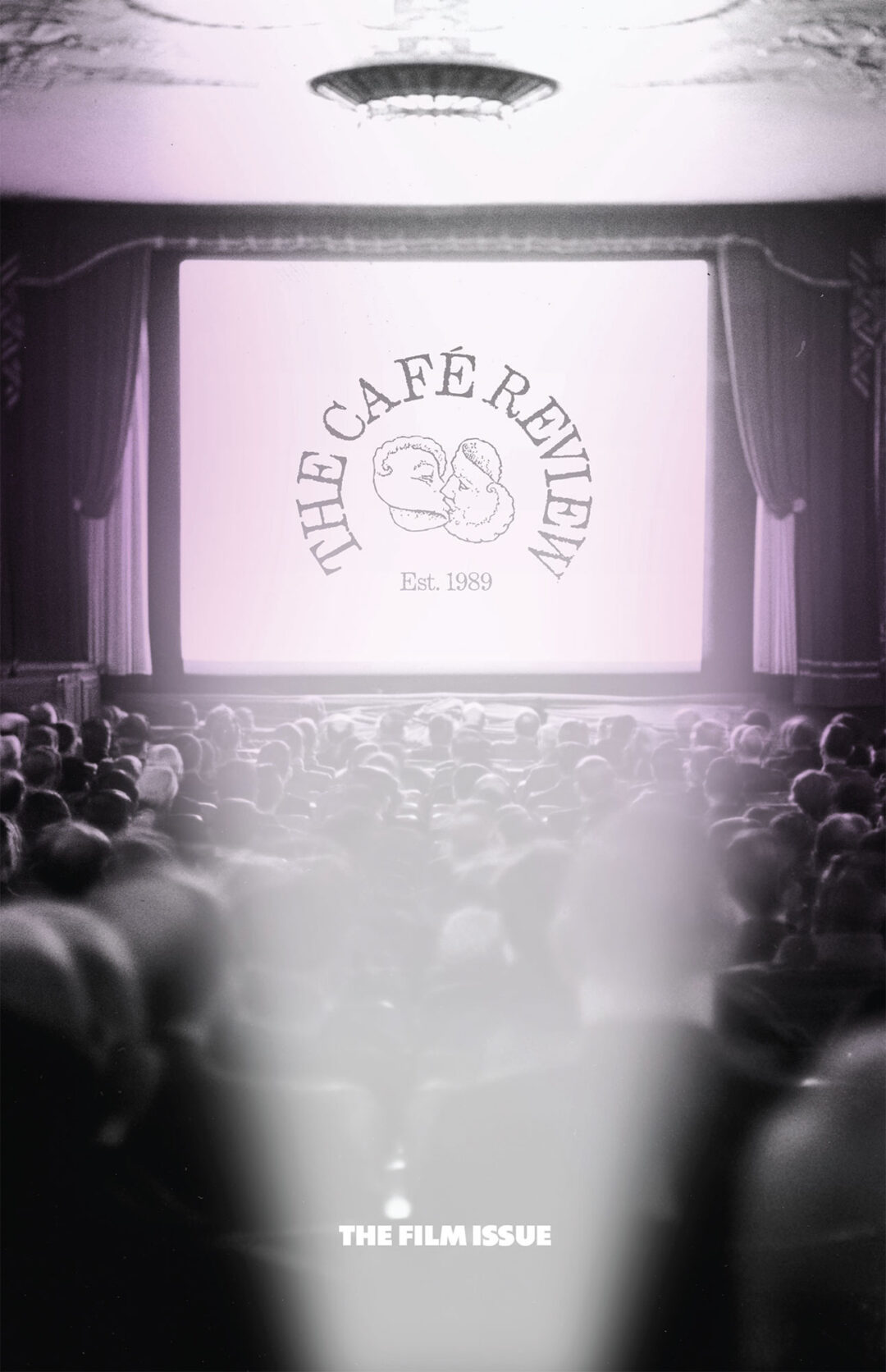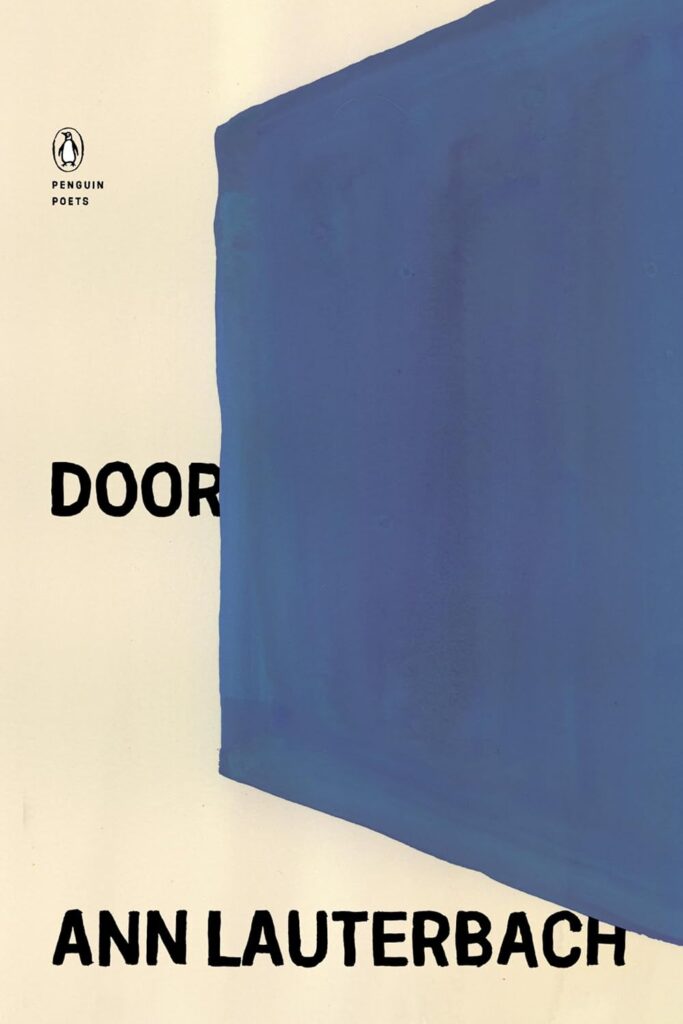Door

Door, by Ann Lauterbach.
Penguin Books, 2023,
94 pages, paper, $20.00,
ISBN: 978–0–14–313737–5
Poet and essayist Ann Lauterbach has published more than thirteen books of poetry and prose. In her newest volume, Door (2023), what is notable is the way Lauterbach has extended her capacity for suspending the reader in a feeling that eludes language. By unraveling syntax and playfully juggling language, by crafting fragments of text that accrue and build on the page, Lauterbach delays, or even perennially defers, the arrival of concrete meaning.
Replete with artfully crafted, jewel–like passages, the poems offer the mysteries of praxis, the complexities of opacity, and places where readers might arrive, and yet — the poet forestalling desire — do not arrive. This new collection contains eight poems titled “Door,” and many more of the poems explore thresholds and crossings, state changes between one place and another, psychological, physical or spiritual. Often these openings and closings are connected to the flow of thoughts, and often the crossing is provisional, a not yet that involves doubt, hesitation and fear, and that retains all possibility, allowing for vital reader participation in meaning–making.
In the very first poem, “Door,” the “world fills up” at an “imperious pace.” Here, an inventory — in other places, an accounting — is reflected by an excess in language and in things, the too–much–ness of life, where meaning seems to overflow and run off:
the ravenous real
flowering
above torsion of waves
unexpected
threshold
thrown open crossed.
Despite its fullness, the poem is a scant sixteen lines, and in this spare beginning we are introduced to Lauterbach’s linguistic leaps and layered images within this volume.
In the beautiful poem “An Interior,” the speaker turns her back on the outside world — one imagines her closing a door — on the mountains, the sun, and the river, to stare at the spines of books: “The spines of books hold a chorus / singing from the dead to the living, / and from the living back to the dead.” Books communicate across seemingly impenetrable thresholds and offer the speaker a means to connect with those who are gone. Here, and in other poems in this collection, an underlying current of grief and loss surfaces; words themselves are tools that both connect and foreclose connection.
The spines’ address is inward and outward,
the once and never more recurring, binding
there into here, like the quick shadow of that bird.
But words don’t care about you, the poet reminds us in another poem, (“On Relation”), “Words are indifferent to how you are feeling about // your feelings.” Words “congregate among themselves” safe from your “desire / to have them meet you exactly where or as meaning // is.” It is this hinged understanding of language that inflects the provisionality of meaning in the poems; language connects — it crosses a threshold between thing and meaning, between self and other — but it also can close things off, create a kind of death or define a limitation.
The eleven–page poem that inhabits the center of the book, titled “Door,” reflects on this power of language to limit and close off meaning, and the slipperiness of our choice in the matter: “The Said closes, is closing, has closed the door.” And:
There is nothing behind the door; there is only
door, a condition, a prospect, a
perception in which a gap occurs, or might
occur, and you can step into or across, you
can leap or fall, you can turn away, go back,
It’s an open–and–shut choice; it’s a dare.
And then, in “Nights in the Asyntactical World,” words pile up and language falls apart:
After lens doubt formidable recess pulse drawing matter
sign of curtain trigger namesake token permanent closure
aching for rhythm literal extension dusted power permission
came lately drawn callow predicate Latin tarnished flickering
ball.
Could this falling apart be a door? Can words thus disordered keep the world in suspension and keep the reader there too, where experience isn’t closed off or shut down? Can we, through language, inhabit the perpetual, unfolding now? “What undergirds / these words? What might be found?” she asks the reader in one of the final poems in the collection, “Blue Door”:
In this atmosphere, nothing is shut, and so motion is the rule, motion without time . . .
— Julie Poitras–Santos
Self–Portrait as NOPE

By Gretchen Rockwell
Self–Portrait as NOPE
after Jordan Peele
What’s a bad miracle ? The dictionary suggests
whatever is the opposite of wonder. Words so often
fail us. I would like for this to not be a bad miracle
but I can’t control what the eye sees, or who is watching.
I am the scream of a terrified horse, the winding down
of a record player, a blooded fist, something arching up
in unexpected motion. I am the observer & the observed,
an animal body trying to survive each night — alien
& new. There is no way to avoid being swallowed whole by
memory, nothing familiar to grasp as it pulls you down.
I tell myself: make something out of your ghosts. If you can
you’ll survive. Probably. The world around me is so wide, sky
open & ominous, the craggy mountains bracketing a place
where miracles — even bad ones — happen. Anything could be
up there waiting, & it is. We can find beauty in the body
& its rebecoming something strange & fierce, the unrippling
into billowing oscillations. I move towards what I fear
will change me as I try to capture this form for all to see.
Don’t look what I am in the eye. Or maybe, finally, do.
Sad Girls

By Michael Colbert
Bri asked why I let myself get to this Sad Girls space
which is different from sad girl space
because here I watch women
and men who I love to hate be miserable
couple and uncouple
agitated magnets like we’re at the fucking north pole
and every show–ending song “hits”
because it’s about unrequited love
it’s I’m over you wink wink
it’s that Someday you’ll want me to want you
so I cry every episode
because someone’s always not
getting who they want
or someone’s getting back together maybe
even if it’s bad
and all this is good because
maybe I’m learning loving kindness
not judging feelings but letting them
be and it’s nice to break
from Lana Del Rey.
That album plays all day in my apartment, my car
I watch the music video on TV. Sometimes her tears
make me try to cry too
Those nights were on fire

By Michael Colbert
Those nights were on fire
after Lana Del Rey
We wanted the beach at sunset but turned right
for the intracoastal, sunset
shimmying along a wobbly plank for the better view.
Lone fishermen
Drawbridge posts catching headlights
so the reflections twinkled as teen girls with ice cream cones
jingled keys to their boat and rode away
into their charmed life, motor churning.
There’s something magical to this city, we agree
almost three years too late, moving here marked
by cockroaches and August / august downpours.
I miss Dong Beach and I miss
this moment before it’s even over.
Salt–fresh from Sunday’s Atlantic dunk
neither of us has rolled on deodorant for days.
It’s time to go. No vacancies
at the motel suites spelling
Summer Sands on the roof
so we go the other way instead
of pulling the U–ey.
This beach town screwed blacklights
into their lampposts and the streets glow violet.
Tonight it’s not Lana but Sam Cooke, Dionne Warwick
and when I could cry, how
beautiful this night has become
I breathe it instead.
The beach still isn’t far.
Only this barrier island away.



